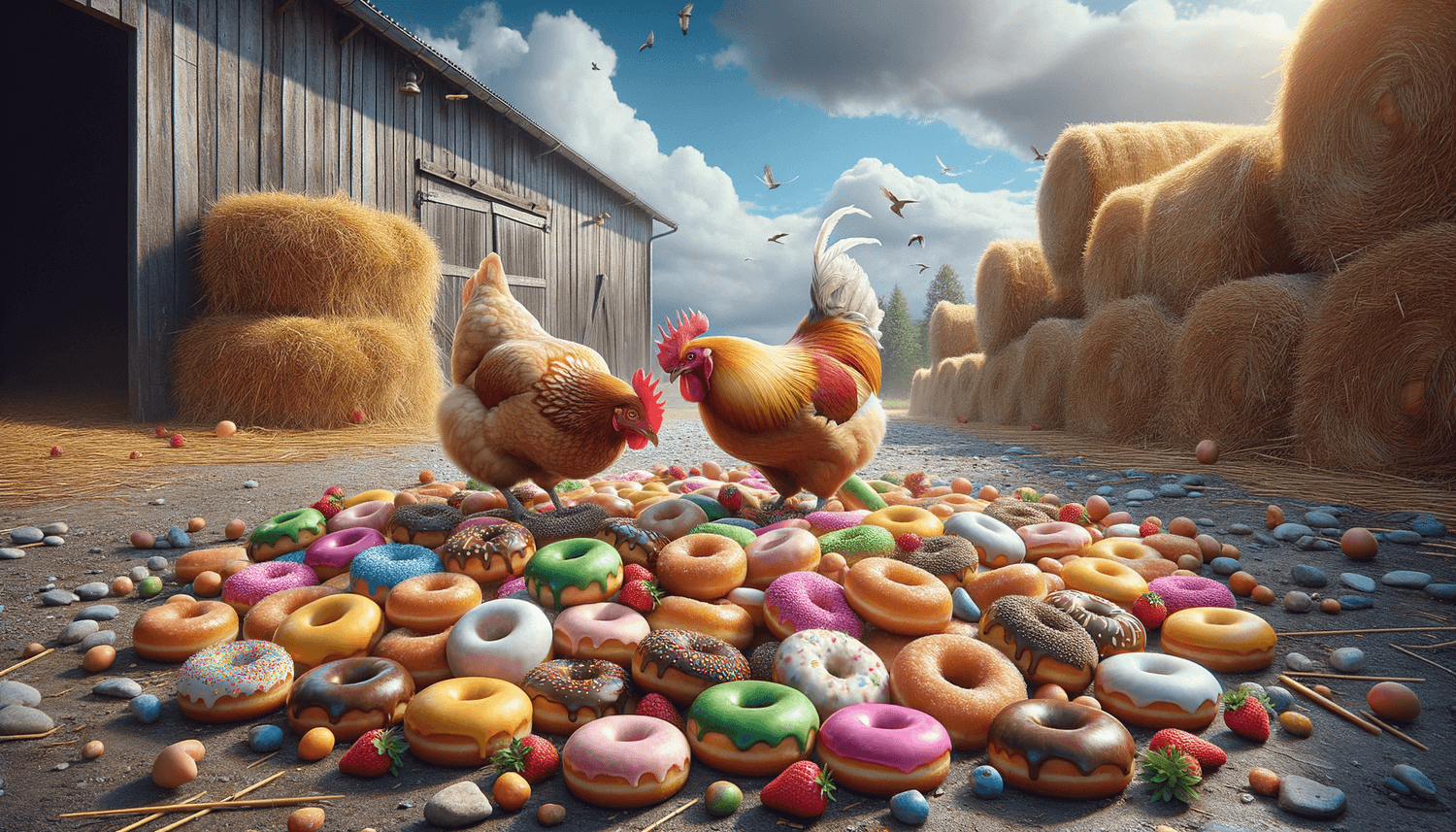Hold onto your feathers, chicken-lovers, because we’re about to delve into a drool-worthy debate: Can Chickens Eat Donuts? As backyard chicken enthusiasts, we love spoiling our clucking companions with special treats from time to time. And what better way to satisfy their sweet beaks than with the scrumptious taste of donuts? But before you go sugar-coating your feathered friends, let’s dissect the ins and outs of a balanced chicken diet, the nutritional value (or lack thereof) of donuts, and how to safely prepare this tempting treat for your brood. So, let’s get cracking on this egg-citing blog post, and let the hen-tertainment begin!
Can chickens eat donuts?
Yes, chickens can eat donuts, but it is not the healthiest option for them. Donuts are high in sugar and fat, which can cause digestive issues and contribute to obesity in chickens if fed in excess. It is safer to offer your chickens healthier treats such as vegetables, fruits, and grains in moderation to maintain a balanced diet.
A balanced diet for your feathery friends
Just like us humans, chickens need a balanced diet to maintain optimal health and well-being. A nutritious chicken diet is essential for their growth, strong eggshells, and overall quality of life. The cornerstone of any good chicken diet is chicken feed, which should make up around 80-90% of their daily intake.
High-quality chicken feed is formulated to meet the specific nutritional requirements of your backyard buddies. It is packed with the right balance of protein, carbohydrates, vitamins, and minerals that keep them healthy and productive. The remaining 10-20% of their diet can be filled with treats like fruits and vegetables, which not only provide variety and enrichment but also offer additional nutrients and hydration for your flock.
Nutritional value of donuts for chickens.
Feeding donuts to chickens offers limited nutritional value. Donuts are high in sugar and fat, which can be detrimental to the long-term health of your flock if offered regularly. While these treats might be tasty for your feathered friends, they do not provide the essential vitamins, minerals, and other nutrients required for optimal overall health and egg production.
Though donuts may contain trace amounts of certain vitamins or minerals, they simply aren’t a sustainable source of nutrition for chickens. The high sugar content in donuts can lead to weight gain and obesity, which can place stress on the digestive system of your chickens and reduce their mobility. Moreover, a diet high in unhealthy fats may negatively impact your chickens’ heart health.
Overall, while chickens can consume donuts, it is not advisable to offer them this treat due to the limited nutritional value and potential health risks. Relying on healthier alternatives like fruits and vegetables will provide your chickens with the necessary vitamins, minerals, and hydration they need to thrive, without impacting their overall health and well-being negatively.
Nutrition table of donuts for chickens.
| Information | Description |
|---|---|
| Nutritional Value | Limited; high in sugar and fat, but low in essential nutrients |
| Suggested Serving Size | Rare and small portions; treat them as an occasional snack only |
| Safe Feeding Practices | Feed sparingly, never as a regular meal substitute |
| Preparation | Break into small pieces and remove any non-edible elements like wrappers |
| Potential Risks | Obesity, digestive issues, heart-health problems |
| Hydration | Minimal; donuts contain little to no water content |
| Digestion | High fat and sugar content can cause digestive issues |
| Seasonal Availability | Not dependent on season; available year-round |
| Other Benefits | None beyond taste; better-suitable treats are available |
Healthier alternatives to donuts for chickens
Given the lack of nutritional benefits and potential risks associated with feeding donuts to chickens, it’s crucial to consider healthier alternatives for occasional treats. Fruits, vegetables, and grains are great options to provide necessary nutrients, vitamins, and hydration to your chickens, without the risks associated with high sugar and fat content found in donuts. Some examples of healthy treats include:
- Leafy greens like spinach, kale, and lettuce
- Fruits such as apples, berries, and bananas
- Vegetables including carrots, cucumbers, and pumpkins
- Grains like oats, barley, and quinoa
Precautions to take when feeding treats to chickens
While providing occasional treats to chickens can be fun and engaging, it’s essential to follow certain precautions to ensure the well-being of your flock:
- Always prioritize high-quality chicken feed, which should make up at least 80-90% of their diet.
- Offer treats in moderation, as over-feeding can cause health issues and impact egg production.
- Do not give spoiled or moldy food to your chickens, as these can contain toxins harmful to their health.
- Make sure to provide clean water on a regular basis to promote healthy digestion and overall well-being.
- Always research any new treat before feeding to your flock, as some human foods can be toxic to chickens.
By following these guidelines and prioritizing a balanced and nutritious diet for your chickens, you can enjoy the benefits of happy, healthy birds and delicious, high-quality eggs.

















